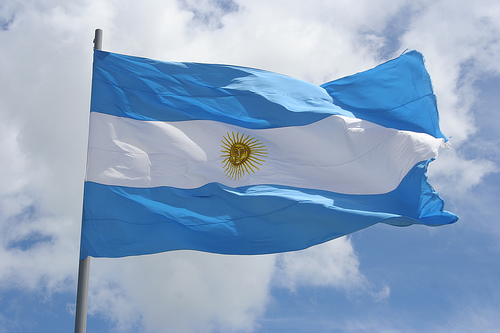Personal Finance
Doug Casey, Chairman
(Interviewed by Louis James, Editor, International Speculator)
L: Doug, we’ve had a lot of people write in with questions about Argentina since the government moved to nationalize YPF. First, I have to tell readers that we saw la presidenta going off the deep end some time ago and sold all the Argentina plays in our portfolio. But you live there, have invested there, and are a famous contrarian – so what do you think? Is the market’s understandable reaction to the expropriation overdone, making it time to buy, or would you still stay out of Argentina plays?
Doug: I’d first like to distinguish between living in a country and investing in a country, which are two totally different things. As a general rule, I’d say that right now I have very little interest in investing in companies doing business in Argentina – though I’ve got to say that the Argentine stock market is yielding about six percent in dividends and selling at about eight times earnings. That makes it one of the cheapest markets in the world. It’s been heavily discounted due to corruption, government stupidity, and a generally poor business environment.
L: So is that discount appropriate or overdone? I suspect that Argentine companies are in no danger of being nationalized, so they might be excessively discounted. On the other hand, the folks behind the curtain, pulling the levers on the machinery of the state in Argentina are clearly fools or knaves – I’m not sure any business is safe in Argentina.
Doug: Unfortunately, that’s true. Argentina’s politicians have been just terminally stupid ever since Juan Perón. Even though he was a criminal personality, an overt admirer of Mussolini, and openly sympathetic to Hitler, Perón has become such a cultural icon that you can’t do anything in Argentina today without at least calling yourself a Perónist. It’s rather like in the US, where, if you don’t think that FDR was a hero for getting the US out of the Great Depression, you’re persona non grata. Perón is Argentina’s Roosevelt.
More recently, former president Nestor Kirchner – late husband of Cristina, the current president – was a total disaster. All of his policies were completely wrong-headed and destructive, but he had the good luck to get elected just as the commodities boom got under way, and demand for Argentine agricultural and mineral products soared. That paid for a lot of social spending and made him look like a hero, even though everything he did was the exact opposite of what needed doing.
This is true of Cristina too, but she’s actually outdone her husband in implementing economically suicidal policies. Every single week, her government does something that’s bizarre, counterproductive, or absurd. The most recent and serious blunder, of course, was the nationalization of YPF – but just a few weeks ago, her government tried to ban the importation of books. It wasn’t because they cared what was in the books, it was part of the effort to limit imports in general.
L: I read about that – the excuse was that foreign printers might use ink that could be dangerous. I remember thinking that was crazy, and she does seem to check into hospitals a lot…
Doug: They had to back down on the books. That would have been just too much, to deprive a very literate country of about 85% of books in Spanish and almost 100% of those in other languages. Although it would have been a boon for Kindle – something they probably didn’t even think about. But importing anything to Argentina is a huge hassle these days.
Nationalizing YPF actually make no sense on any basis. She says she did it because the company didn’t invest enough in Argentina – but there’s a reason for that: the current regime has made it very dangerous to conduct any sort of productive business in Argentina. As a result of its policies, Argentina has gone from being self-sufficient in oil and gas – and an exporter – to being an importer. She’s telling everyone that nationalizing YPF will result in more investment in Argentina and hence more production, but that’s a fantasy. Like any national oil company, YPF under its new management is going to be horribly inefficient and riddled with graft and corruption. If they do somehow generate any earnings, they’ll just be wasted by the government on social programs that buy votes but don’t make any lasting improvement in the country.
Of course, YPF started out as a parastatal in the ’20s, so the company has always been a political football. Under Perón it accumulated scores of thousands of unneeded employees. In Argentina they’re called “gnocchis,” after the heavy, doughy, inexpensive pasta that kind of just lies on your plate and does nothing. In fact, Argentines traditionally eat gnocchi on the last day of each month, partly because it’s cheap and money is short at month’s end and partly because it’s a joke about useless government employees. The average guy in Argentina is well aware of how corrupt the system is. It’s why Argentines are always making jokes about themselves – lots of black humor.
On the other hand, there’s an explanation for these actions other than insanity. Rumor in Argentina has it that when Nestor was first elected, the Kirchners had a net worth on the order of ten million dollars. That’s not a lot for a governor…
L: [Chuckles] Yes, what a couple of slowcoaches; any self-respecting Latin-American politician ought to have been able to abscond with at least a hundred million.
Doug: [Laughs] Yes, at least a hundred million. Over his entire term, Carlos Menem is said to have walked away with as much as $15 billion. Why should anyone settle for less?
L: So you’re suggesting that maybe she’s not crazy, but rather a successful political entrepreneur who may yet set a new record at enriching herself at the expense of the people she claims she’s trying to help?
To Read More CLICK HERE

By Jack Crooks
“Beam me up Scotty.”
– Star Trek
Once again it seems the Fed Chairman Bernanke didn’t disappoint the stock bulls. I expected otherwise. Wrong again I was. I continue to be amazed by Ben’s logic here.
He says he wants to produce some inflation through monetary policy so the US economy doesn’t get caught up in a Japanese-like deflationary spiral. But in the process of creating inflation, which is in commodity prices primarily, thanks to the implicit weak dollar policy (driven by the Treasury and deftly executed by the Fed), he hurts consumers and businesses with many of these policies even though he tells us he is really saving them.
So, let me see if I get his right:
Pay those who save nothing on their deposits
Then further reduce their purchasing power by creating inflation
Continue to punish the interbank lending market (because of zero interest rates); therefore, banks have no incentive to lend to other banks that may actually have real economy lending opportunities.
Pretend the US labor market is healing, when it is now starting to weaken again, and unofficial unemployment and under-employed rate is off the charts, proving that something is very wrong with existing policy.
Then proceed to tell us how much this policy is working, and just in case there is a slowdown, tell us we will get more of this same policy that is working so well.
My head hurts after writing that.
But we do know who this policy helps—the financial economy; which consists of some very smart people who know where their bread is buttered and just so happen to have a lot of extra money lying around to make campaign contributions. Hmmm…
So Ben, you are telling us to forget about:
To Read More CLICK HERE

Submitted by Gunter Leitold
Will bond investors and savers have to hold forced government loans at some point in the future?
Numerous governments of developed countries are likely to fail when trying to liquidate their large debt burdens in an orderly way. Japan, for example, steadily widened its debt load over the past 22 years and thereby constructed the largest bankruptcy waiting to happen. Since 1990, new borrowings and interest payments were the biggest contributors to build up the Japanese state of pre-insolvency. While Japanese government bond yields have been around 2.6% p.a. on average, these yields were still 2% above nominal GDP growth of just 0.6%.
The chance of not being able to de-leverage is dangerously high when the free market requires a nation to pay interest rates significantly above its nominal growth rate. The nations of the European periphery, Portugal, Spain, Italy and Ireland currently overpay nominal growth rates in the long term bond market by 11,01%, 5.84%, 5.09% and 4.38% respectively. They are directly heading towards the need of a restructuring while Greece has a good chance of requiring a second one.
Nominal interest rates set around 1% – 2% below nominal growth rates for a significant period of time would be needed to help these countries to leave the debt build-up course behind. This change of interest rates would erase mark-to-market losses on sovereign bond positions for the semi-solvent banking sector, but it would also wipe out the carry and leave them without earning power on this part of the balance sheet. However, some of them would still need to restructure. Keeping the high government interest rates in place will lead to some spectacular restructurings in the future.
I assume if central planners decide to circumvent the already manipulated bond market and enforce much lower interest rates by implementing forced loans, there would be a big uproar for some time in the market. However, the negative wealth effect on the private sector would be more foreseeable and stretched out over a longer period of time. This definitely would decrease uncertainty. In my opinion, this measure would actually help to break through the downward spiral and avoid the much more devastating course towards a restructuring event with its negative side effects.
Everyone and their dog realizes that suffering the whole pain of a restructuring event at once is a bad alternative compared to spreading the pain over a longer period of time and spreading it in an orderly and less uncertain way.
It seems that the free market does not provide this option without harsh government intervention. The free market tends towards capital flight, wider risk spreads and thereby makes a restructuring event at the end of the road more likely. Greece for that matter has been half-solved at best and therefore has a good chance of being back on the brink soon.
I believe that at some point, we may see the implementation of a temporary regime which includes forced government loans for domestic private sector participants paired with strict capital controls for as long as the de-leveraging is going on.
To Read More CLICK HERE

By: Marin Katusa
There’s a major shift under way, one the US mainstream media has left largely untouched even though it will send the United States into an economic maelstrom and dramatically reduce the country’s importance in the world: the demise of the US dollar as the world’s reserve currency.
For decades the US dollar has been absolutely dominant in international trade, especially in the oil markets. This role has created immense demand for US dollars, and that international demand constitutes a huge part of the dollar’s valuation. Not only did the global-currency role add massive value to the dollar, it also created an almost endless pool of demand for US Treasuries as countries around the world sought to maintain stores of petrodollars. The availability of all this credit, denominated in a dollar supported by nothing less than the entirety of global trade, enabled the American federal government to borrow without limit and spend with abandon.
The dominance of the dollar gave the United States incredible power and influence around the world… but the times they are a-changing. As the world’s emerging economies gain ever more prominence, the US is losing hold of its position as the world’s superpower. Many on the long list of nations that dislike America are pondering ways to reduce American influence in their affairs. Ditching the dollar is a very good start.
In fact, they are doing more than pondering. Over the past few years China and other emerging powers such as Russia have been quietly making agreements to move away from the US dollar in international trade. Several major oil-producing nations have begun selling oil in currencies other than the dollar, and both the United Nations and the International Monetary Fund (IMF) have issued reports arguing for the need to create a new global reserve currency independent of the dollar.
The supremacy of the dollar is not nearly as solid as most Americans believe it to be. More generally, the United States is not the global superpower it once was. These trends are very much connected, as demonstrated by the world’s response to US sanctions against Iran.
US allies, including much of Europe and parts of Asia, fell into line quickly, reducing imports of Iranian oil. But a good number of Iran’s clients do not feel the need to toe America’s party line, and Iran certainly doesn’t feel any need to take orders from the US. Some countries have objected to America’s sanctions on Iran vocally, adamantly refusing to be ordered around. Others are being more discreet, choosing instead to simply trade with Iran through avenues that get around the sanctions.
It’s ironic. The United States fashioned its Iranian sanctions assuming that oil trades occur in US dollars. That assumption – an echo of the more general assumption that the US dollar will continue to dominate international trade – has given countries unfriendly to the US a great reason to continue their moves away from the dollar: if they don’t trade in dollars, America’s dollar-centric policies carry no weight! It’s a classic backfire: sanctions intended in part to illustrate the US’s continued world supremacy are in fact encouraging countries disillusioned with that very notion to continue their moves away from the US currency, a slow but steady trend that will eat away at its economic power until there is little left.
Let’s delve into both situations – the demise of the dollar’s dominance and the Iranian sanction shortcuts – in more detail.
To Read More CLICK HERE

















